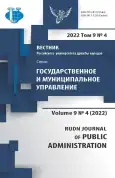Renewable Energy Sources and the Government Strategy for Developing Energy Sector in Jordan
- Autores: Al-Qteishat A.S.1
-
Afiliações:
- Peoples’ Friendship University of Russia (RUDN University)
- Edição: Volume 9, Nº 4 (2022)
- Páginas: 456-465
- Seção: INTERNATIONAL EXPERIENCE OF PUBLIC ADMINISTRATION
- URL: https://journal-vniispk.ru/2312-8313/article/view/317717
- DOI: https://doi.org/10.22363/2312-8313-2022-9-4-456-465
- ID: 317717
Citar
Texto integral
Resumo
Energy and energy security are strategic goals for various countries of the world because energy is an important component of life. As the energy problem is gradually aggravating worldwide, especially with the increasing demand for it by a large percentage, and it is expected that these percentages will rise significantly during the coming period because of population growth and the significant increase in the number of various industrial and service establishments. Currently, most countries are seeking to rationalize in energy consumption, and to search for alternatives to energy sources. Hence, there is a keen interest in energy sources and their alternatives. In this study, energy sources and their alternatives in Jordan were identified in order to get an adequate idea of w hat is available in Jordan from this area. Jordan is one of the poor countries in traditional energy sources, and one of the countries most affected by the high prices and the shortage in the production of crude oil and other energy components, and its negative repercussions on the Jordanian economy, as Jordan imports oil and natural gas from neighboring countries 90 % of its needs Energy, which is approximately 8 %-10 % of GDP. This study attempts to shed light on the existing energy sources in Jordan with the aim of exploring ways to improve the energy situation in the country by increasing reliance on renewable energy alternatives such as wind and solar energy instead of relying on imported oil and gas.
Palavras-chave
Sobre autores
Ahmad Al-Qteishat
Peoples’ Friendship University of Russia (RUDN University)
Autor responsável pela correspondência
Email: ahmad_qteishat@hotmail.com
ORCID ID: 0000-0003-3393-2210
PhD in Political Science, Assistant Professor of the Department of State and Municipal Management
6, Miklukho-Maklaya str., Moscow, Russian Federation, 117198Bibliografia
- Caglayan A. Renewable energy education in Turkey. Renewable Energy. 2011; 36(2): 608-611.
- Energy Security: Reliable, Affordable Access to All Fuels and Energy Sources. Energy security - Topics - IEA. URL: https://www.iea.org/topics/energy-security (accessed: 01.10.2022).
- Alrwashdeh S.S. Energy Sources Assessment in Jordan. Results in Engineering. 2022;13:1-8. https://doi.org/10.1016/j.rineng.2021.100329
- About Renewable Energy Sector. Energy and Mineral Regulatory Commission. URL: https://emrc.gov.jo/Pages/viewpage?pageID=111 (accessed: 01.10.2022).
- New Policy and Low Cost. Ministry of Investment. URL: https://www.moin.gov.jo/en/renewable-energy/ (accessed: 01.10.2022).
- Jordan Issues Record Number of Work Permits to Syrian Refugees. UNHCR - The UN Refugee Agency. URL: https://www.unhcr.org/news/press/2022/1/61effaa54/jordanissues-record-number-work-permits-syrian-refugees.html (accessed: 01.10.2022).
- Baniyounes A.M. Renewable Energy Potential in Jordan. International Journal of Applied Engineering Research. 2017; 12(19): 8323-8331.
- Jordan - Renewable Energy. Privacy Shield. URL: https://www.privacyshield.gov/article?id=Jordan-Renewable-Energy (accessed: 01.10.2022).
- Jordan Imports JD2.8 billion Worth of Energy in 2021. Jordan News Agency. 03.06.2022. URL: https://www.jordannews.jo/Section-113/All/Jordan-imports-JD2-8-billion-worth-ofenergy-in-2021-18843#:~:text=Al%2DMamlaka%20TV%2C%20quoting%20the,worth%20of%20energy%20in%202021 (accessed: 01.10.2022).
- Summary of Jordan Energy Strategy 2020-2030. Ministry of Energy and Mineral Resources. URL: https://www.memr.gov.jo/EBV4.0/Root_Storage/EN/EB_Info_Page/StrategyEN2020. pdf (accessed: 01.10.2022).
- Energy 2019-Facts & Figures. Ministry of Energy and Mineral Resources. URL: https://www.memr.gov.jo/ebv4.0/root_storage/en/eb_list_page/bruchure_2019.pdf. Accessed: 01.10.2022.
- Dar-Mousa R.N., Makhamreh Z. Analysis of the Pattern of Energy Consumptions and Its Impact on Urban Environmental Sustainability in Jordan: Amman City as a Case Study. Energy Sustainability and Society. 2019; 9(15): 1-12. https://doi.org/10.1186/s13705-0190197-0
- Abu-Rumman G., KhdairA.I., Khdair S.I. Current Status and Future Investment Potential in Renewable Energy in Jordan: An Overview. Heliyon. 2020; 6(2): 1-8. https://doi.org/10.1016/j. heliyon.2020.e03346
- Shatnawi N., Abu-Qdais H., Abu Qdais F. Selecting Renewable Energy Options: An Application of Multi-criteria Decision Making for Jordan. Sustainability: Science, Practice and Policy. 2021; 17(1): 209-219. https://doi.org/10.1080/15487733.2021.1930715
- Kehinde A., Nelson I., Jonathan C. Exploring the Environmental and Economic Impacts of Wind Energy: A Cost-benefit Perspective. International Journal of Sustainable Development & World Ecology. 2020; 27(8): 718-731. https://doi.org/10.1080/13504509.202 0.1768171
- Wind Power in Jordan and the Arab World (2022). German Energy Academy in Jordan. URL: https://www.gea-jordan.academy/wind-power-in-jordan-and-the-arab-world-2022/ (accessed: 01.10.2022).
- Renewables Readiness Assessment: The Hashemite Kingdom of Jordan. International Renewable Energy Agency. URL: https://www.irena.org/publications/2021/Feb/RenewablesReadiness-Assessment-The-Hashemite-Kingdom-of-Jordan (accessed: 01.10.2022).
Arquivos suplementares










